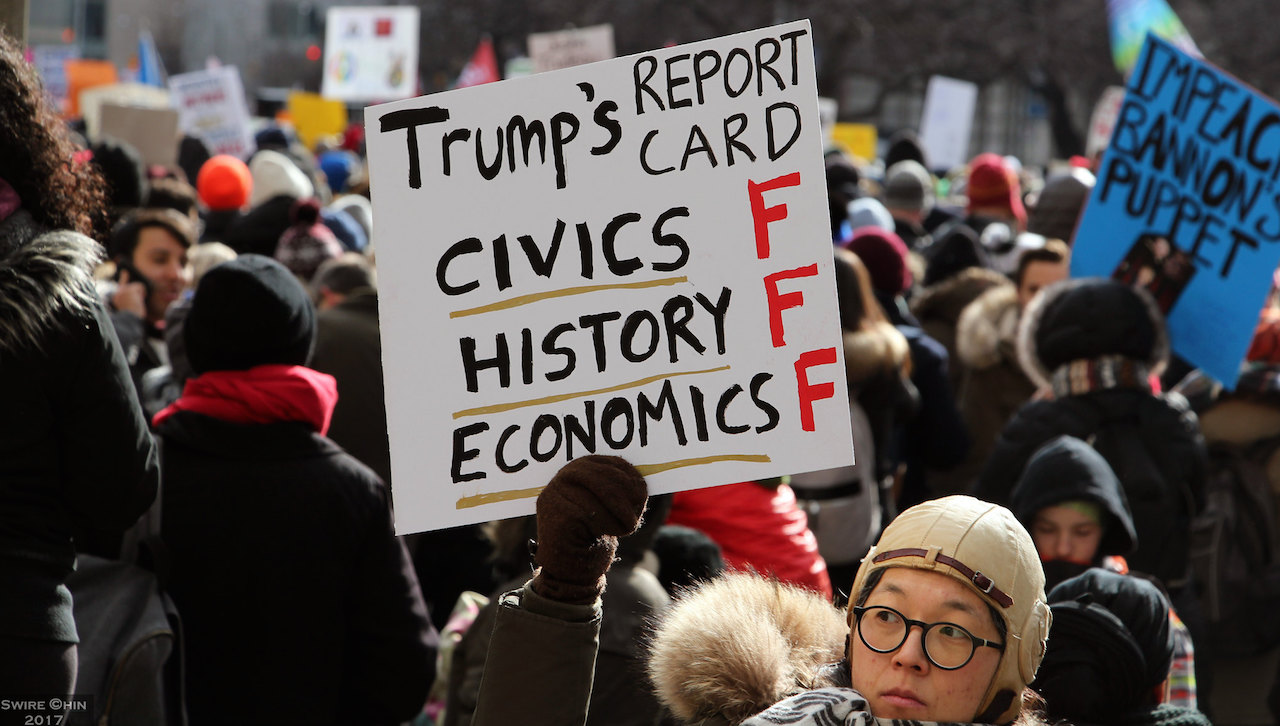The U.S. is now at peak derangement on the Trumpometer, which measures Americans’ states of mind, not Trump’s. Salon surveyed “Trump’s Wacky, Angry, and Extreme August” with tips on fighting “Trump depression.” The New Yorker portrayed “a dark journey to a nasty and contentious place.” New York Times columnist Maureen Dowd wrote: “We’ve been trying to figure out for three years if he is a mad aberration … or is rewiring the game in some permanent way.”
Observers will note this angst mostly arises in journalists and/or liberals who feel they’re no longer receiving the deference they deserve. It’s their equanimity that’s achieved maximum disruption, through, e.g., being labelled fake news. There are many people in America’s inner cities or its ravaged, formerly industrial states, or outside the U.S. — in Gaza, or Honduras — who were born into and will die in some hideous but normalized bedlam. So Trump depression implies a certain insular smugness — though I deeply sympathize with my American friends who haven’t slept through a night since 2016.
Some Canadians join in, like the Globe’s Lawrence Martin: “There’s a cancer on this presidency that has to be exorcised.” But mostly we don’t, and not just because we lack Trump. (We have wannabes, like Doug Ford, who recently visited the U.S. and declared himself a Republican at customs.) It’s because, despite deceptive similarities, we’re not them, something it’s always useful to recall. This election continues to provide reminders, such as:
- Guns. Last week was gun week. Prime Minister Justin Trudeau discussed guns daily. Conservative Leader Andrew Scheer said guns aren’t the problem, gangs are. This is unlike the debate in the U.S. Gun “rights” there aren’t about hunting or even the right to resist oppressive governments. They go back to their revolution and fears that a huge slave population might seize guns to free themselves, after the U.S. Constitution failed to.
So gun ownership was prohibited for Blacks, even after they’d fought in the Civil War. At least that’s Jonathan Metzl’s argument in his fine book, Dying of Whiteness. It’s why “gun rights” belonged only to those suppressing Indigenous peoples. The plot lines in Hollywood westerns I grew up on, made that clear: It’s always bad white guys who sell illegal guns to “the Indians.” It never occurred to any of us to ask why Indians didn’t have Second Amendment rights, too. This still echoes in Black Lives Matter shooting incidents.
There are hints of it here. In one CBC doc, an Ontario gun owner says people like him are “more thoroughly vetted than Trudeau’s token Syrian refugees,” as if Canadians need guns to combat immigrating terrorists. That’s disconcerting but it doesn’t approach the depths of race anxiety in the U.S.
- Affordability. Drill down minimally and you’ll find the affordability issue is about cutting taxes so “you” can decide how to spend “your money” instead of handing it to government. That has an appeal here but far more so there. Why? Metzl, a psychiatrist and great listener, quotes someone who wants to repeal Obamacare even though it will leave him medically vulnerable. He says, “To be honest I can’t even think about it [Obamacare] right now, I’m so concentrated on the illegals.” That’s nearly incomprehensible to Canadians.
What he means is, if racialized “others,” like refugees, rise toward his status via programs like public health care, using his taxes, it’ll undermine the sense of superiority that his whiteness provides: it’s what W.E.B. DuBois called “the psychological benefits of being white.” This, says Metzl, “turns whiteness into a statistically perilous category.” You imperil your physical existence for the sake of your tenuous, race-based, identity.
The issue arose this week due to Liberal plans to run deficits. (So do Tories, but they’re really sad about it.) In my view, these are bogus fears built on abstract numbers. But taking Metzl’s insight, the risk isn’t that governments will go into debt by running deficits, it’s that they’ll be used to create programs that break down inequality and dent the self-esteem of certain demographics. That kind of existential dread surely lurks here but it abounds in the U.S.
Some of this may sound unreal, and some quite familiar. That’s the unique effect of living so close and feeling so far from their gobsmacking reality.
Rick Salutin writes about current affairs and politics. This column was first published in the Toronto Star.
Image: Can Pac Swire/Flickr




